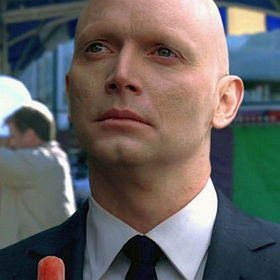Let's talk about Lost in Space with a big <<SPOILER ALERT>> for those who haven't finished watching and intend to do so. With that out of the way, let us proceed :).
As I have said before, December of 2021 had lots of entertainment options. One that I watched during the twelfth month was Netflix's Lost in Space, which saw its third (and last) season get released. One of the most important aspects of this show in previous seasons was Will Robinson (played by Maxwell Jenkins) and his relationship with the killer alien robots. So I was not surprised to see this theme go full circle with season three, because it was the alien robot really that started all of their struggles. If you don't know, it's because it attacked their ship and forced them to crash land at the very beginning of the series in season one.
In season 3, we get a lot of questions answered, and we also get some incredible landscape shots that show that Netflix really dumped some money into this series to make it look good. Overall, I was very pleased. One of the highlights happened when they found a lost city that was built by the civilization that built the robots. Will Robinson plays with an alien computer, using a severed and mummified hand that he gets from an alien corpse that is probably thousands of years old.
This is our first hint at what these creatures might have looked like and (big surprise) they designed the robots to look like themselves. The robots also ended up destroying them. This comes in a confession made by SAR, who is the leader of the evil robot legion. SAR ends up savagely damaging Will's physical heart, and this in turn ends up being a plot device whereby Will's robot friend can save him, and also destroy SAR. So the final act of the show ends up broadcasting this huge message of trust...and how trust is what makes it possible to overcome life and death obstacles.
My favorite part of Lost in Space though is a matter of contention. You see, it is an unpopular opinion: I loved Doctor Smith. Played by Parker Posey, this character was a narcissist and asshole. However, I saw many things that I identified with regarding that character that are echoed in myself. For example, she did what she could to ensure her own survival. I get that, and she overcame obstacle after obstacle that other people put in her way. Her tremendous survival instinct flew in the face of those who were arrayed against her, and who repeatedly underestimated her intelligence and quite frankly, did not want her there.
It seems painfully apparent that the Robinsons had the unvoiced opinion that Dr. Smith was not worthy of being saved from a dying Earth (and of course they were). In fact, Dr. Smith belonged back at Earth suffering from the abuse that she endured by toxic family and then perishing in the destruction of the planet. But she wasn't going to have any of that, and she lied, cheated, and stole her way into a life for herself that was better than dying on a world that thought she was garbage. Sure...the character is completely self-interested. But that's because no one in the entire world in which she inhabits cares about this character at all. No one. She has nothing. I know exactly what that is like.
But whereas a person who is in the same position might just say, "To hell with it...no one cares at all about me or will even check in on me so I might as well commit suicide and die," she goes in the opposite direction. She chooses a path to live, and in doing so, she causes tremendous problems for everyone else. But why should Dr. Smith die so that it makes the highly educated and perfect family of the Robinson's life easier? It's almost like the Robinson's have this halo about them that says, "This is the family that deserves to survive." It's like the worst kind of virtue signaling.
And I'm the person that asks, "Why? Because they are smart? Because they don't have disabilities? Why do they get the shot at an amazing life and this other person does not?" So yeah...I love Dr. Smith. She was chosen for extinction, and she said, "Not today." I see that instinct in me, flying in the face of pre-destined greatness supposedly possessed by other people (as if some were just born to be leaders while others need to clean toilets). Here in Utah, there's a certain "kind" of person that ends up with a house, nice car, nice family, nice job, etc. I never fit into that. But through my own determination and guile, I ended up with those things anyway. And there's actually a bit of schadenfreude that I experience when I see people who are "that type" fail at getting the things that I got. I don't feel guilty about it at all. I am my own Dr. Smith. I wish that life didn't have to have winners and losers. But it does, and I was damned committed to not being one of those that ended up on the losing end of things despite the fact that I was unwanted (being fat, gay, atheist, mixed race in an area of the country that prizes whiteness, and any number of other things). So yeah...Dr. Smith is an amazing character. And she made the whole show incredibly interesting.
I know that Lost in Space is done. However, I do hope that there might be a spinoff at some point where we could see additional adventures in the universe created by the show. One that stars Parker Posey would be an amazing place to start. Did anyone else watch the show? If so, what did you think?













